
Discover Nano
metrics 2024
Igniting Discussions in Nanoscience and Beyond
Introduction
Discover Nano is a pioneering journal published by SPRINGER, dedicated to the rapidly evolving field of nanoscience and nanotechnology. Established in 2023, this innovative platform provides an open-access forum for researchers, professionals, and students to share and disseminate cutting-edge findings in materials science and condensed matter physics. With its commitment to accessibility, Discover Nano encourages a broad spectrum of contributions, aiming to foster collaboration and stimulate discussion in this dynamic area of study. As a new entry into the academic community, the journal holds great potential for growth, aspiring to increase its visibility and impact in the materials science arena, where it currently ranks in the bottom quartile for both materials science and physics categories. Based in Germany and reaching a global audience, Discover Nano represents a significant opportunity for those looking to shape the future of nanotechnology through impactful research and interdisciplinary dialogue.
Metrics 2024
 -
- -
- -
- -
-Metrics History
Rank 2024
JCI (Web Of Science)
Quartile History
Similar Journals
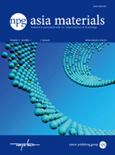
NPG Asia Materials
Unveiling Breakthroughs in Condensed Matter PhysicsNPG Asia Materials, a premier journal published by NATURE PORTFOLIO, stands at the forefront of research in the fields of condensed matter physics, materials science, and modeling and simulation. With an impressive Impact Factor gracing its Q1 rankings in 2023, this open-access journal, established in 2012, offers a vital platform for disseminating high-quality research articles, reviews, and perspectives that advance the understanding of material properties and innovative applications. Based in the United States and catering to a global audience, NPG Asia Materials features cutting-edge contributions that not only enhance academic scholarship but also provoke discussions relevant to both industry and academia. Researchers, professionals, and students are invited to explore its extensive archive of work, covering insights from 2009 to 2024, in a bid to stay abreast of the latest developments in these rapidly evolving scientific domains.

Physical and Chemical Aspects of the Study of Clusters Nanostructures and Nanomaterials
Unveiling the Chemistry of Tomorrow's MaterialsPhysical and Chemical Aspects of the Study of Clusters, Nanostructures, and Nanomaterials is an esteemed open-access journal published by TVER STATE UNIVERSITY, dedicated to advancing the scientific discourse surrounding the intricate interplay of physical and chemical properties in nanostructure materials. Launched in 2017, this journal provides a vital platform for researchers, professionals, and students to disseminate and access cutting-edge findings in the rapidly evolving fields of nanotechnology and materials science. With an ISSN of 2226-4442 and an E-ISSN of 2658-4360, it aims to bridge the gap between academic research and practical applications. By facilitating open access to high-quality research, the journal plays an essential role in promoting innovative solutions to contemporary challenges in engineering, materials development, and related industries. The journal's scope includes but is not limited to the synthesis, characterization, and functionalization of nanomaterials, ensuring comprehensive coverage of this multidisciplinary field.
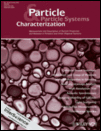
PARTICLE & PARTICLE SYSTEMS CHARACTERIZATION
Exploring the Frontiers of Particle SciencePARTICLE & PARTICLE SYSTEMS CHARACTERIZATION is a distinguished journal dedicated to advancing the knowledge within the fields of Chemistry, Condensed Matter Physics, and Materials Science. Published by WILEY-V C H VERLAG GMBH in Germany, this journal has established a solid reputation since its inception in 1984, showcasing research aimed at understanding the intricate properties and behaviors of particulate systems. With an impressive Q2 ranking in its respective categories and Scopus ranks indicating a robust standing in the global research community, it serves as an essential resource for researchers, professionals, and students. Although it does not currently offer Open Access options, its comprehensive articles and reviews provide valuable insights that contribute significantly to the ongoing discourse in these scientific domains. As it prepares to celebrate four decades of publication, PARTICLE & PARTICLE SYSTEMS CHARACTERIZATION continues to provide a vital platform for emerging knowledge, fostering innovation and collaboration among scientists dedicated to the study of particle systems.
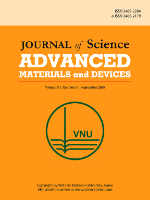
Journal of Science-Advanced Materials and Devices
Catalyzing Knowledge in Advanced Materials and DevicesJournal of Science-Advanced Materials and Devices is a leading open-access journal published by Vietnam National University, dedicated to advancing the field of materials science through cutting-edge research and innovative developments. Since its inception in 2016, this journal has become a pivotal platform for sharing insights and discoveries in various subfields, including biomaterials, ceramics and composites, and electronic, optical, and magnetic materials. With impressive quartile rankings, including Q1 across multiple categories in 2023, and a notable Scopus ranking placing it in the top 15th percentile for ceramics and composites, it highlights the journal’s influence and prestige within the global academic community. Open Access since its launch, the journal aims to facilitate unrestricted dissemination of scholarly work, empowering researchers, professionals, and students to engage with the latest advancements. The Journal of Science-Advanced Materials and Devices is vital for those seeking high-quality contributions that influence both theoretical understanding and practical applications in the ever-evolving landscape of materials science.
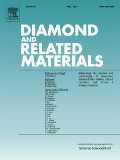
DIAMOND AND RELATED MATERIALS
Fostering innovation in diamond and related materials.DIAMOND AND RELATED MATERIALS, published by Elsevier Science SA, serves as a premier international platform for the dissemination of high-quality research in the fields of materials science, electrical engineering, and chemistry, with a specialized focus on diamond and its related materials. With an ISSN of 0925-9635 and an E-ISSN of 1879-0062, this journal has established itself within the top quartiles, reflecting its influential contribution to the scientific community, particularly in the categories of Chemistry (miscellaneous) and Electrical Engineering, among others. The journal's wide scope encompasses both theoretical and applied aspects of diamond research, making it an essential resource for professionals and academics alike. The current rankings position it favorably within its respective disciplines, with a notable 79th percentile in General Physics and Astronomy and strong standings in related categories. Although it does not offer open access, researchers can stay informed of cutting-edge advancements and methodologies through its comprehensive articles and reviews, enriching the wider discourse in advanced materials research.
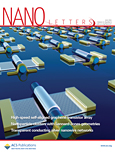
NANO LETTERS
Connecting researchers with cutting-edge nanoscience insights.NANO LETTERS is a leading journal, published by the American Chemical Society, that focuses on the rapidly evolving field of nanoscience and nanotechnology. With an impressive impact factor and consistently ranked in the Q1 category across multiple disciplines including Bioengineering, Materials Science, and Condensed Matter Physics, it serves as an essential resource for researchers and professionals aiming to stay at the forefront of nano-related advancements. This journal, available in print and online (ISSN: 1530-6984, E-ISSN: 1530-6992), features cutting-edge research articles that explore the intricate interplay between nanoscale materials and emerging technologies, driving innovation across various sectors. As of 2023, NANO LETTERS holds prestigious rankings, including a top position in several Scopus categories, underscoring its impact within the scientific community. Published continuously since 2001, NANO LETTERS is dedicated to disseminating high-quality research papers that inspire and inform the next generation of scientists and engineers.
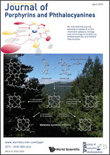
JOURNAL OF PORPHYRINS AND PHTHALOCYANINES
Unveiling the Potential of Key Chemical CompoundsJOURNAL OF PORPHYRINS AND PHTHALOCYANINES, published by WORLD SCIENTIFIC PUBL CO PTE LTD, is an influential peer-reviewed journal dedicated to advancing the field of porphyrins and phthalocyanines, key compounds in both chemistry and materials science. With an ISSN of 1088-4246 and an E-ISSN of 1099-1409, this journal has been a vital resource since its inception in 1997 and is expected to continue until 2024. The journal holds a respectable position in the academic landscape, categorized in the Q3 quartile for miscellaneous Chemistry journals and ranked #252 out of 408 in the general chemistry category according to Scopus, reflecting a growing impact in the field despite its current percentile standing at 38th. JOURNAL OF PORPHYRINS AND PHTHALOCYANINES seeks to publish original research articles, reviews, and critical studies that explore the synthesis, characterization, and applications of these versatile compounds, which play essential roles in numerous scientific disciplines, from catalysis to materials development. This journal is an indispensable platform for researchers and professionals seeking to disseminate their findings, engage with contemporary discussions, and stay informed about cutting-edge advancements in porphyrin and phthalocyanine research.

Nano Materials Science
Empowering Scientists to Shape Tomorrow's Materials.Nano Materials Science is a premier open-access journal dedicated to the dissemination of groundbreaking research in the fields of nanotechnology, materials science, and chemical engineering. Published by KEAI PUBLISHING LTD, this journal has quickly established itself as a leading platform in its area since its inception in 2019, with impressive rankings in the Scopus database, holding a Q1 position across multiple categories, including Chemical Engineering and Materials Science. Based in Beijing, China, Nano Materials Science provides researchers and practitioners access to a wealth of high-quality peer-reviewed articles, fostering innovation and collaboration within the scientific community. With its impact factor steadily rising and a commitment to open access, the journal aims to bridge the gap between theoretical research and practical applications, making it an essential resource for professionals and students eager to stay at the forefront of materials research and nanotechnology advancements.
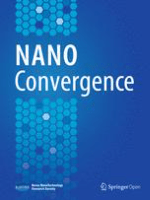
Nano Convergence
Connecting ideas, materials, and engineering at the nanoscale.Nano Convergence is a premier open access journal dedicated to the rapidly evolving fields of nanotechnology, materials science, and engineering. Published by SPRINGER, this journal has been at the forefront of interdisciplinary research since its inception in 2014, and is set to continue its journey until 2024. With an impressive impact factor and recognition as Q1 in both Engineering (miscellaneous) and Materials Science (miscellaneous) categories, Nano Convergence ranks among the top publications, listed as Rank #8 out of 307 in General Engineering and Rank #34 out of 463 in General Materials Science according to Scopus metrics. This journal provides a platform for researchers, professionals, and students to share pioneering studies that converge different disciplines within nanotechnology. With its commitment to open access, Nano Convergence ensures that cutting-edge research is readily available to the global community, fostering innovation and collaborative advancements in the field.

Journal of Nano Research
Exploring Innovations in Nano ResearchThe Journal of Nano Research, published by Trans Tech Publications Ltd, is a distinguished academic journal dedicated to the rapidly evolving field of nanotechnology and materials science. With an ISSN of 1662-5250 and an E-ISSN of 1661-9897, the journal has been an important platform for researchers and professionals since its inception in 2008, continuing to provide high-quality peer-reviewed research through to 2024. Nestled in Switzerland, the Journal of Nano Research plays a pivotal role in disseminating cutting-edge findings, as recognized by its categorization in Q3 for Materials Science and Physics while being positioned in Q4 for Nanoscience and Nanotechnology as of 2023. With Scopus rankings highlighting its impact, including Rank #129 in general Physics and Astronomy and Rank #300 in Materials Science, this journal is crucial for academics seeking to stay ahead in research trends and innovations in nano-related disciplines. Although it operates under a subscription model, the journal's objectives include fostering collaboration and knowledge-sharing among researchers, making it an invaluable resource for anyone immersed in the world of nanotechnology.